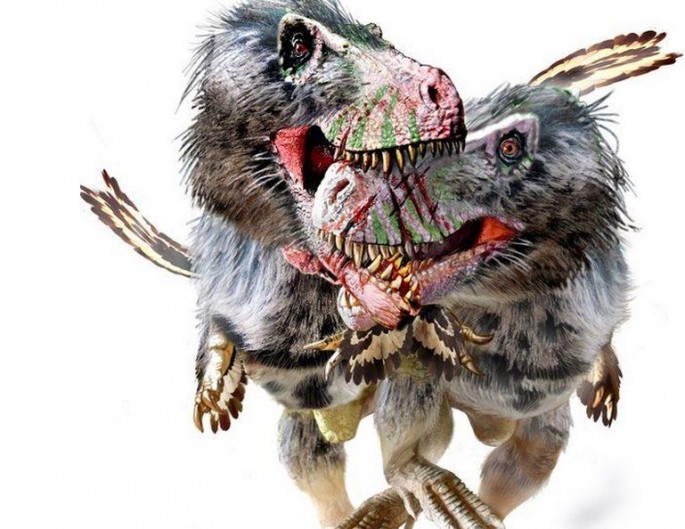Scientists have found proof confirming long-held suspicions the feared Tyrannosaurus Rex or T. rex was a cannibal that preyed on its own species.
A study by scientists from Queen Mary University of London said the skull of an adolescent Daspletosaurus, a smaller cousin of the T. rex unearthed in Canada in 1994, showed signs of vicious combat and of being eaten either by a T. rex or another dinosaur.
The 500 kg Daspletosaurus about six meters long received many terrible wounds while alive, and was then chewed-up by a scavenger after its death. Bite marks were found on the beast's skull, which is 55 cm long.
Scientists said it was accurate to say this dinosaur might have died at the hands of a T. rex because they know of no other large predator with big enough teeth that were alive in the same place at the same time. This dinosaur died in the Late Cretaceous epoch some 100.5 Ma to 66 Ma.
"This animal clearly had a tough life, suffering numerous injuries across the head including some that must have been quite nasty," said lead author Dr. David Hone from Queen Mary.
"The most likely candidate to have done this is another member of the same species, suggesting some serious fights between these animals during their lives."
The fossil also shows a circular, tooth-shaped puncture hole in the back of the head from a powerful bite, said the BBC.
Not all of the injuries on came from bites, but many of them do match the shape of tyrannosaur teeth, wrote Dr. Hone and his colleague, Darren Tanke, a senior technician at the museum in the open-access journal, PeerJ.
The surface of the bone, however, showed evidence of healing, suggesting this juvenile Daspletosaurus didn't die from these injuries. The scientists said the exact cause of this beast's death is unknown but more bite marks on its jaws appear to have been made as the beast was decaying.
This means it was probably scavenged by another large tyrannosaur that might well have been a T. rex although this can't be determined with any accuracy.
Dr. Hone and Tanke noted a study that found evidence of cannibalism in T. rex and said it "cannot be ruled out" in the case of this Daspletosaurus.
A study published in 2010 revealed evidence of cannibalism among T. rex. Scientists that studied these fossils found tooth marks in the humerus, foot bones and metatarsals but saw these marks as evidence for opportunistic scavenging, rather than wounds caused by combat.
In a fight, the scientists said it would be difficult to reach down to bite the feet of a rival, making it more likely the bite marks were made in a carcass.




























